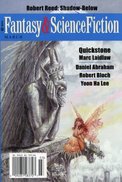
| Editor: | Gordon van Gelder |
| Issue: | Volume 116, No. 3 |
| ISSN: | 1095-8258 |
| Pages: | 162 |
I'm really enjoying the classic reprints that F&SF is doing, particularly accompanied by the retrospectives from former staff members. In this issue, William Tenn tells the story of how he became editor of the magazine and how he handled editing "That Hell-Bound Train" by Robert Bloch. It's quite entertaining and just the right length.
I hope F&SF sticks with the classic reprints even after the anniversary year ends, even though it's one less slot for a new writer. One an issue feels about right.
"The Curandero and the Swede" by Daniel Abraham: Subtitled "A Tale from the 1001 American Nights," this story layers multiple stories inside each other, discursively discussing anger, revenge, and the purpose of storytelling. It took review after finishing the story to wrap my mind around the point that Abraham was making, but once I did, I found it illuminating and less obvious than most stories about anger and revenge. The individual stories as stories weren't very memorable to me, but the angle on making meaning out of life that Abraham takes will stay with me for a while. (7)
"The Unstrung Zither" by Yoon Ha Lee: This is a story about the interrogation of prisoners during an interstellar war, told from the perspective of an outside expert who is brought in to understand them and uncover their secrets. However, combat is based on a sort of elemental magic from flying ships called dragons that don't appear to entirely follow our laws of physics. The prisoners are adolescents from what seem to be colony worlds that have broken away from Earth and advanced in technology. And the outside expert is a master musician, whose task is to compose the music of the heart of each prisoner and, from that, learn their secrets.
I adored the world background of this story. I want to read a novel or a whole series in this world. Ling Yun is a wonderful protagonist, the interplay between the characters is engrossing and dangerous, and the hints of world background set questions and glimmers of stories spiralling through my head. The only drawback to this story from my perspective is an ending that I thought came a bit out of nowhere, and which may improve on re-reading. Highly recommended, the best story of this issue. (9)
"That Hell-Bound Train" by Robert Bloch: This is the classic reprint of the issue, and is one of those famous idea stories in SF (fantasy in this case) that long-time genre readers have probably heard the basis of even if they've never read it. A man makes a deal with the devil to get a watch, which he can use at any point to stop time. But if he doesn't use the watch before he dies, he goes off to hell in the train. I won't spoil the direction the story takes from there if you're not familiar with it, but it follows one of the classic reversals of the gifts of the devil and then surprises the reader. A classic well worth reading, and a reprint I'm glad for. (7)
"Quickstone" by Marc Laidlaw: This is another story of Gorlen the bard, last seen in "Childrun". Like that story, this is fantasy in a fairly classic setting, featuring a bard with one stone hand. This story goes more directly to Gorlen's past, sending him in search of the gargoyle from which his current hand was taken and which has his human one. I found it a bit plodding and not something I would seek out, but there are some memorable descriptions of a vast underground world and a nice treatment of a rock deity. (6)
"Shadow-Below" by Robert Reed: This is another story set in Reed's world of a lost tribe of Native Americans, last seen in "Less than Nothing". It's the story of a guided wilderness expedition told from the third-person perspective of someone connected to that tribe and to the outside world. Given that I only barely remember the earlier story and haven't read the three previous, I found it rather oblique and frustratingly lacking in background material. It also lacked the typical Reed ending to drive home the point, leaving me a bit unsure about why I cared about these characters or where it was going. (It didn't help that at one point I was certain it was going to be a Gilligan's Island parody, which ended up being both wrong and distracting.) I usually like Reed, but I think this was a weak story. (5)
Reviewed: 2009-08-25